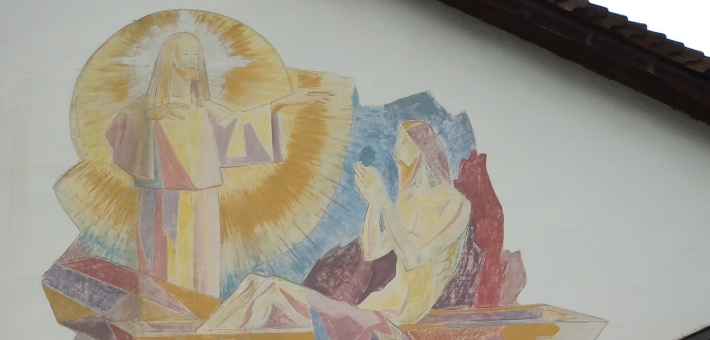Commentary on Revelation 21:1-6a
“See, I am making all things new” (Revelation 21:5).1
As we enter Revelation 21 everything has changed. With John we see both a new heaven and a new earth. A holy city descends from heaven, resplendent with gold, jewels, and divine light. After chapters of trauma and conflict on a cosmic scale, after Death and Hades finally meet their end, everything has become new.
Ironically, this dramatic newness draws from ancient wells. It pulls from Isaiah 65:17, which also proclaims new heavens and a new earth, an order so completely transformed that “former things” are forgotten (see Isaiah 43:18–19; 66:22). When I hear this passage from Revelation, I think back to Paul, who declares a renewal that has already been accomplished in Christ. Appropriating Isaiah’s language, Paul declares old things passed away. “See, everything has become new!” (2 Corinthians 5:17). In announcing the dissolution of the old order and the arrival of the new, Revelation reasserts very old promises.
Revelation’s proclamation of total newness grounds itself in God’s character. First, God has demonstrated God’s own faithfulness toward Israel. This is the dimension Isaiah celebrates: the God who chose and formed Israel as a people will see to Israel’s salvation. Second, for the author of Revelation the “testimony of Jesus” embodies that divine faithfulness by making possible the renewal of all things. In Israel, and specifically through Israel’s Messiah, God has always been working salvation and renewal. Now, Revelation proclaims, is the moment of consummation.
Consummation indeed, for the holy city arrives adorned as if she were a bride being presented to her husband. Many readers will find this metaphor troubling. After all, ancient brides typically enjoyed little agency in the selection of their husbands and would be subject to their men for life.
We are to imagine very young women, usually in their early teens, dressed so as to appeal to husbands just about twice their age. As a bride, the new city appears in stark contrast to the “great city” presented in Revelation 17. The new bride will be dressed simply, modestly, as opposed to Babylon’s precious metals, fine jewelry, and richly dyed garments.
There’s no escaping the patriarchy that determines this image. At the same time, the bride’s modest appearance stands in contrast the opulence—extravagance purchased through the exploitation of millions—that adorns Babylon.
Preachers will know that many congregants scarcely expect a good word from Revelation. For example, some will reject Revelation because they regard it as too world-averse. Our society loves this heaven and this earth. In many ways that’s a good thing.
Our consumerist culture invests ultimate value in enjoying the here-and-now. Revelation’s message that the here-and-now must pass away for a new thing sounds not only silly but even offensive to modern ears. What about the glorious creation we inhabit: Should we not cherish it? What about the many loves we enjoy: Should we abandon them? Does Revelation call us to despise the wondrous world in which God has planted us?
Preachers will also look out for those congregants who expect Revelation to provide pie-in-the-sky salvation, an escape from the troubles and conflicts of this world. According to this view, Revelation destroys the world we inhabit, along with most of the people who dwell in it, in order to deliver holy people to “heaven” with its pearly gates and golden streets. Some Christians actually hope for this outcome. According to the rapture theology so prevalent in some circles, believers will be taken up to heaven before the world descends into chaos.
More common are the Christians who expect the gospel to provide other-worldly salvation without effecting much change in this world. On All Saints Day we are especially mindful that all of us share the hope for life beyond death, including our connection with the saints who have preceded us.
Both sets of hearers, the world-affirmers and the world-escapers, need help hearing this passage. Two features of this passage, often overlooked, provide resources that may renew our imaginations.
First, the new creation features no sea. The sea’s absence may trouble us at first. Almost all of us love water. We take particular pleasure in the ocean. (For Revelation’s readers, “the sea” means the Mediterranean.) But for Revelation, the sea’s absence belongs with the eradication of death, mourning, crying, and pain. As it does in some other Jewish literature of the period, the sea is where evil empires operate. In the great war, Satan takes his stand alongside the sea, and the wicked beast arises out of that very same sea (Revelation 12:18–13:1).
The beast makes war against Jesus’ followers and kills many of them. Moreover, the beast is closely aligned with the great city; after all, Babylon rides upon the beast’s back. When the “great city” is destroyed, those who mourn include especially political rulers (“kings”), merchants, and sailors (18:9–20). The beast-ly empire conducts its military and diplomatic operations on the sea, just as it handles commerce on the sea.
In Revelation, the sea’s absence does not reflect aversion to the world; instead, it’s part of Revelation’s condemnation against an empire that uses war and commerce to oppress ordinary people.
Second, we note that the new city comes down to us from heaven. We do not go up to it. Revelation does not imagine the saints escaping this world for a heavenly reward. On the contrary, the saints inhabit a brand-new world created right where they live. This new world may not have a sea, but it does include a river, “bright as crystal” (Revelation 22:1).
This new world hardly represents an escape from everyone else and their troubles. When Revelation says God has come down to dwell with mortals (21:3), it means it. The loud voice proclaims, “These peoples will be God’s” (21:3, my translation). Drawing again from Isaiah’s vision, Revelation describes “the nations” walking in the light of the new city (21:24) and finding healing therein (22:3; see Isaiah 60:11; Jeremiah 3:17). Revelation envisions a renewal, not an escape.
Notes
- Commentary previously published on this website for November 1, 2025 (All Saints).


November 3, 2024